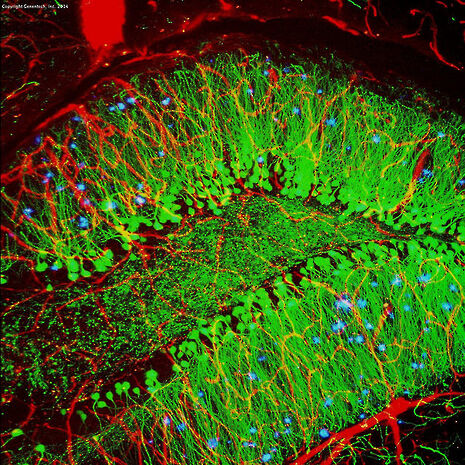Molecular guardian angel for Alzheimer’s patients discovered at Cambridge
Cambridge scientists have identified a molecule that appears to halt the death of brain cells in Alzheimer’s disease

A molecule that stops the development of Alzheimer’s disease has been identified by a research team from the Department of Chemistry.
Brichos, as the scientists named the molecule, attaches itself to malfunctioning proteins which cause the symptoms of Alzheimer’s disease. By doing so, it stops those proteins from coming together, which prevents them from forming highly toxic clusters which spread the disease around the brain.
The moment when damaged proteins form clusters is considered to be one of the crucial stages in the development of Alzheimer’s, without which the disease cannot appear. By finding a molecule that prevents the formation of these clusters, researchers have come closer than ever before to finding a substance that cures the disorder. The discovery is especially important because the methods used to identify Brichos can now be used to search for other molecules with similar properties, which would immensely increase the options for the development of a drug for Alzheimer’s.
Dr Samuel Cohen, a Research Fellow at St. John’s and one of the authors of the report, commented that the amount of work needed to achieve this breakthrough has been staggering. He is now hopeful that the time has come to reap the rewards of this effort and get closer to finding an effective treatment for Alzheimer’s.
Alzheimer’s disease, identified in 1901 by the German psychiatrist Alois Alzheimer, causes about 70 per cent of dementia cases. It starts slowly with episodes of memory loss and goes on to rob the sufferer of their ability to speak clearly, navigate their surroundings, care for themselves, and function socially. Average life expectancy is between three and nine years from the onset of symptoms. The causes of Alzheimer’s are poorly understood, but it is clear that both nature and nurture play a role in the development of the disease.
Alzheimer’s is one of a number of neurodegenerative conditions caused by damaged proteins that ultimately impede the functioning of the nervous system. This makes the discovery of Brichos even more significant, because the same procedure could have implications for Parkinson’s disease and motor neuron disease. As life expectancy in the developing world increases, research into neurodegenerative diseases becomes more important than ever before.
 Comment / Plastic pubs: the problem with Cambridge alehouses 5 January 2026
Comment / Plastic pubs: the problem with Cambridge alehouses 5 January 2026 News / Cambridge businesses concerned infrastructure delays will hurt growth5 January 2026
News / Cambridge businesses concerned infrastructure delays will hurt growth5 January 2026 News / New movement ‘Cambridge is Chopped’ launched to fight against hate crime7 January 2026
News / New movement ‘Cambridge is Chopped’ launched to fight against hate crime7 January 2026 News / AstraZeneca sues for £32 million over faulty construction at Cambridge Campus31 December 2025
News / AstraZeneca sues for £32 million over faulty construction at Cambridge Campus31 December 2025 Interviews / You don’t need to peak at Cambridge, says Robin Harding31 December 2025
Interviews / You don’t need to peak at Cambridge, says Robin Harding31 December 2025









